| |
|
Alexandra Barron
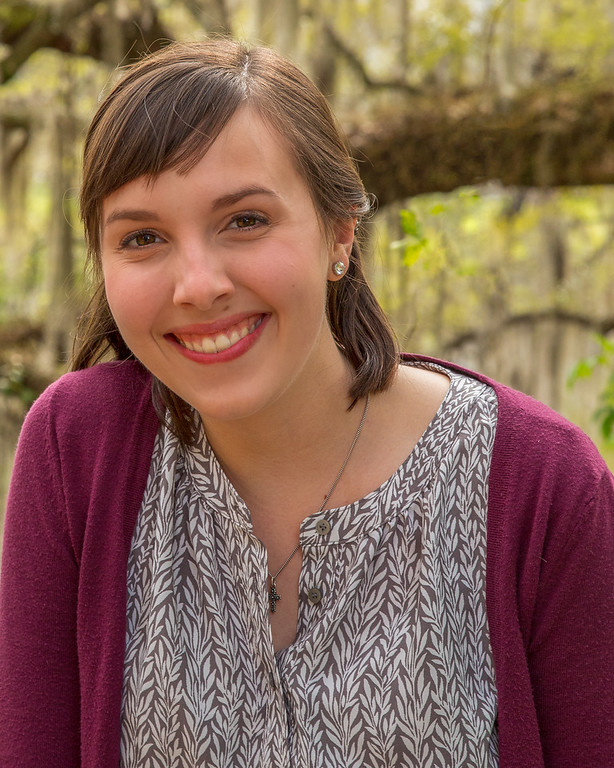
Alexandra Barron
Chemical and Biological Engineering
Advisor: Robert C. Brown
Poster link
LinkedIn
|
Enhancing Mass Transfer in Gas Fermenters for Production of Single Cell Protein
My research focuses on overcoming the mass transfer limitations in gas-liquid systems. Specifically, we are evaluating new methods of gas-liquid contacting to improve commercial systems such as beverage carbonation, gas fermentation, and other applications requiring gases to be dissolved in liquid process streams. My central research project evaluates the viability of growing single cell protein on hydrogen, oxygen, and carbon dioxide as a method of carbon recycling. The low-solubility and explosive nature of this gas system requires a new approach unique from conventional gas fermentation systems, and I hope my proposed system will provide a solution. This singe cell protein product would serve as a protein source in animal feed to help reduce the emissions associated with animal protein production.
|
Angelos Lagoudakis
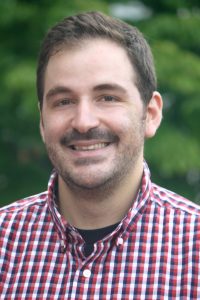
Economics
Advisor: Drs. Dermot J Hayes &
Poster link
LinkedIn
|
Food Choices and their Effect on Health and Nutrition: An Economic Investigation
I am an applied microeconomist focusing on food and health economics, consumer and producer behavior, and industrial organization.
I employ applied microeconometrics and experimental economics methods to answer questions relevant to economists, data analysts, and policymakers.
|
Connor Thorpe

Materials Science and Engineering
Advisor: Dr. Shan Jiang
Poster link
LinkedIn
|
Identifying Factors that Determine Effectiveness of Delivery Agents in Biolistic Delivery Using a Library of Amine-Containing Molecules
My research focuses on improving the ability to deliver biological reagents into plant cells using biolistic delivery. I am currently designing and developing new tools that improve cell transfection rates significantly while reducing the overall error in the system commonly attributed by experiments with biological tissues. I also use advanced computation fluid dynamic simulations to better understand the effects of the new devices by studying the dynamics of the system.
|
Emmanuel Padmore Mantey
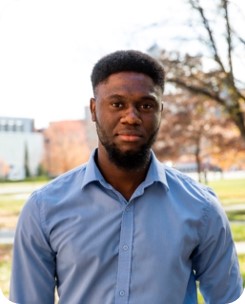
Civil, Construction and Environmental Engineering
Advisor: Dr. Lu Liu
Poster link
LinkedIn
|
Cost Curves: A Novel Decision-Making Tool in The Water Industry with Focus on Water Reuse
My current research aims to build an inventory that quantifies the water available for reuse. Data will be collected from sources like storm water, agricultural runoff and return flow, municipal wastewater, and rainwater. The end goal of the research is to combine these data into one body across attributes like spatial and temporal resolution for consistency and level of detail in a data structure.
|
Elmin Rahic
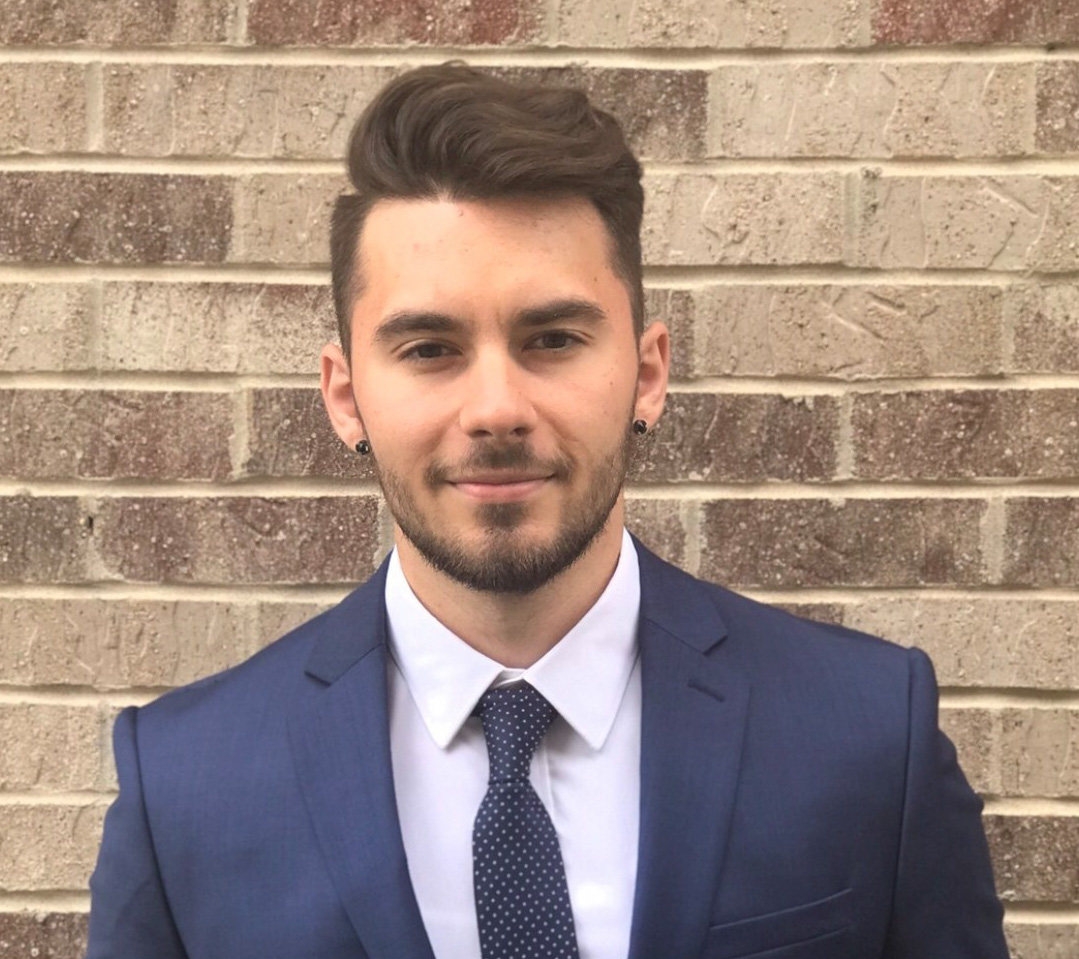
Agricultural and Biosystems Engineering
Faculty Advisors: Drs. Zhiyou Wen and Robert Brown
Contact: erahic@iastate.edu
Poster link
LinkedIn
|
Bioprocessing strategies to valorize perennial biomass
My research investigates various bioprocessing strategies to valorize perennial biomass crops. These biomass crops provide important environmental and ecological services on the landscape, but often come at a cost to farmers. I’m currently looking at two strategies: anaerobic digestion (codigestion) strategies with animal manure and a novel enzyme fermentation process. My work incorporates a mixture of experimental data collection and model generation, as well as techno-economic and life cycle analyses.
|
Fatemeh Ganji
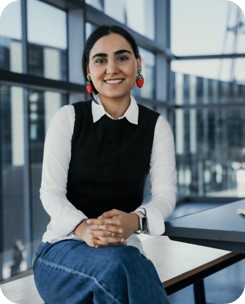
Civil, Construction and Environmental Engineering
Advisor: Dr. Lu Liu
Poster link
LinkedIn
|
Implications of Climate Change Mitigation and Socioeconomic Development on the US Electric Power Sector
My interest areas are climate change and its effects, as well as the Water-climate-energy nexus. I worked on investigating climate change’s impact on surface water resources in my master’s. Currently, I am exploring integrated assessment modeling (e.g., GCAM) to assess future electricity and water demand under different climate change and socio-economic development.
|
Júlia Brittes Tuthill

Agricultural and Biosystems Engineering
Advisor: Dr. Amy Kaleita
Poster link
LinkedIn
|
Harmonizing Iowa’s Resources: Modeling, Tool Development, and Data Synthesis for the IFEWs
My research is in collaboration with the IFEWs research group, a project which is developing an Iowa Food-Energy-Water simulation model, to create the model database and develop a visualization tool to observe the relationship between agricultural products (food, feed, biofuels) and water quality through nitrogen export for decision-making facilitation.
|
Taylor Vroman
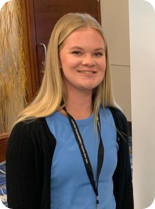
Environmental Science
Advisor: Dr. Michelle Soupir
Poster link
LinkedIn
|
Microbial Communities as a Pathway to Improved Woodchip Bioreactor Design and Performance
My research focuses on analyzing the microbial communities within corncob and woodchip bioreactors to optimize the performance of the edge-of-field conservation practice. I am currently using nitrate removal, greenhouse gas production, water chemistry, and gene presence to determine performance in laboratory upflow columns. My research will allow for optimization of field bioreactors.
|
|
Logan Johnson
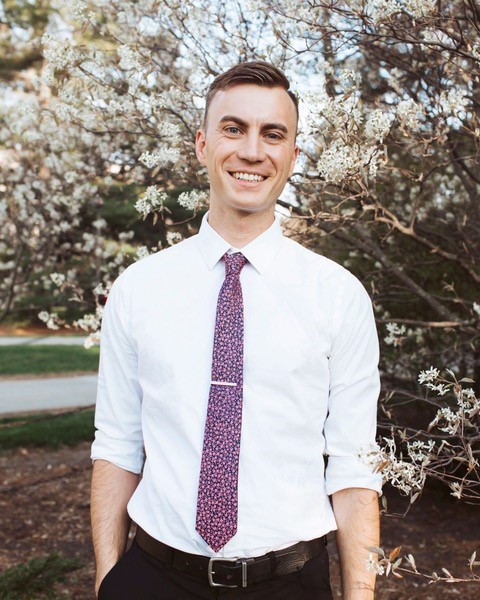
Animal Science
Faculty Advisor: Dr. Brian Hornbuckle
Contact: mgk1@iastate.edu
Poster link
LinkedIn
|
Using a Machine Learning Approach to Predict Pork Loin Quality from Proteomic Data
Global livestock production and meat consumption continue to rise, increasingly contributing to climate change and drawing heightened scrutiny. There is an increased desire to produce livestock more efficiently while producing less waste products. My research aims to identify molecular factors—such as specific proteins and metabolites—and associations of these factors to livestock production efficiency and meat product quality. Machine learning techniques have the potential to better determine connections in larger, more complex data sets. By better understanding the molecular factors affecting livestock production efficiency, this research could guide producers towards more sustainable practices, contributing to the broader goal of reducing the environmental footprint of meat production.
|
Luke Soko
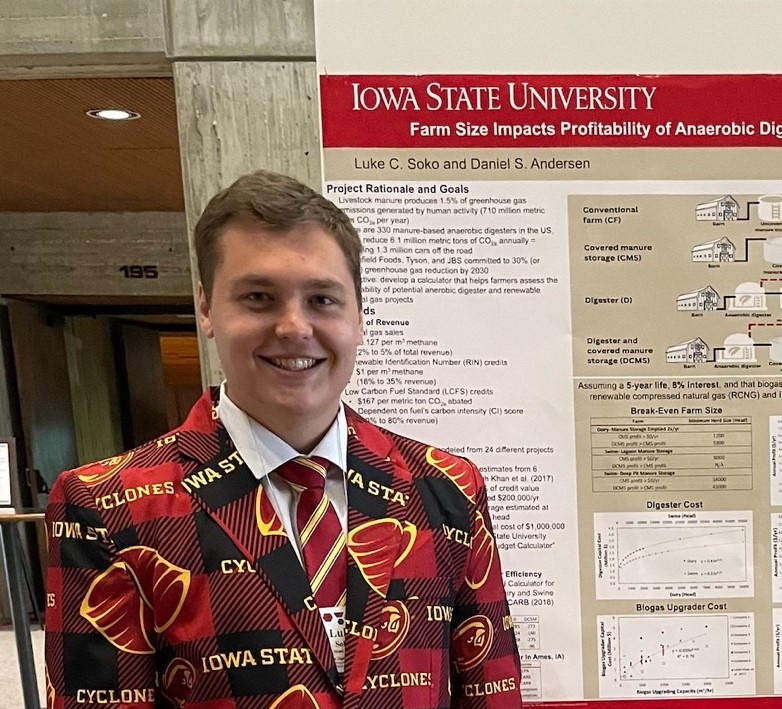
Agricultural and Biosystems Engineering
Faculty Advisor: Dr. Dan Andersen
Contact: lcsoko@iastate.edu
Poster link
LinkedIn
|
Farm Size Impacts Profitability of Anaerobic Digestion Renewable Natural Gas Projects
My research includes analyzing the economic feasibility of biogas projects. Specifically, I investigate how different farm sizes, livestock, travel distances, conveyance methods, digester types, and feedstocks impact project profitability. I create models to determine the costs and revenues of anaerobic digester projects in different scenarios.
|
Matt Kavanaugh

Agronomy – Agricultural Meteorology
Faculty Advisor: Dr. Brian Hornbuckle
Contact: mgk1@iastate.edu
Poster link
LinkedIn
|
Developing a Dynamic Planting and Harvesting Algorithm in Order to Improve SMAP Soil Moisture Retrievals
My research focuses on using microwave remote sensing to monitor changes in the water content of soil and vegetation throughout the growing season. In particular, the spring planting and fall harvest periods when microwave soil moisture retrievals are influenced by a combination of soil surface roughness as well as the water in plants. In order to distinguish between these two, the goal is to develop an algorithm that enables microwave satellites to determine when crops are planted and harvested. I hypothesize that this will improve soil moisture retrievals throughout regions that are dominated by seasonal agriculture. Better soil moisture measurements will improve weather and climate forecasting, and agricultural lands management in an economically and environmentally responsible manner.
|
Nicole Kling
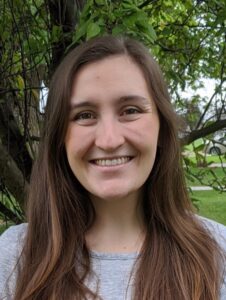
Food Science and Human Nutrition – Nutritional Science
Faculty Advisor: Dr. Lorraine Lanningham-Foster
Contact: nrkling@iastate.edu
Poster link
LinkedIn
|
Assessment and Promotion of Environmentally Sustainable and Healthy Dietary Patterns
Little is known about Americans’ trust nutritional scientists and registered dietitian nutritionists. This is concerning for two major reasons: (1) trust is essential to effective communication, and (2) trust in science is influenced by various social factors, including political and religious beliefs. Without a clear understanding of how and why people trust professionals and what factors influence said trust, nutrition professionals are less equipped to communicate with their audiences of interest. The goal of my doctoral research is to fill this gap in knowledge through qualitative and quantitative research.
|
| |
|
| |
|